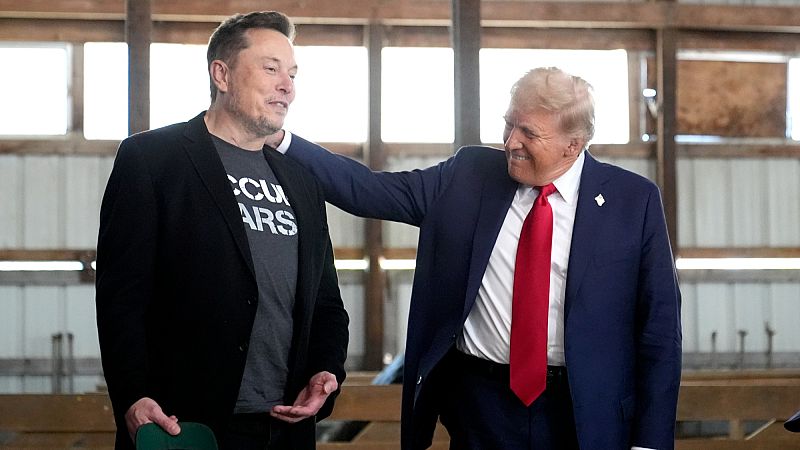
A new report published by a prominent American senator’s office this week sheds light on how the first 130 days of US President Donald Trump’s second term may have benefited Elon Musk, the world's richest man.
Democratic senator Elizabeth Warren’s office compiled a 14-page document using a combination of media reports, White House statements, and think tank research to identify over 100 occasions where Musk’s companies and his own personal wealth benefited during his time with the unofficial Department of Government Efficiency (DOGE).
A statement on Warren’s website describes the report as a list of actions where Musk or White House officials "broke ethics norms and precedent or may have violated laws regarding federal employees’ participation in matters in which they have a financial interest," while benefiting Musk’s business concerns.
The report alleges that these actions have increased Musk’s personal wealth by "at least" $100 billion (€85.4 billion) and wiped out a potential additional $2.37 billion (€2.07 billion) in business liabilities from Musk’s record.
Warren’s report comes in the wake of a very public fallout this week between Trump and Musk, who left his role at DOGE earlier this month.
USAID shut down to avoid probe into Starlink terminals
Warren’s report claims that Musk had conflicts with "at least 70 per cent" of the government departments that his new role came after.
The report claims that President Trump fired the USAID Inspector General, who was set to inspect Musk’s satellite company Starlink for its role in providing services to Russia in its ongoing war against Ukraine.
In one of the most controversial moves of his early presidency, the report claims that Trump then tried to shut down USAID in light of this pending investigation.
Trump then announced a pause of US foreign development assistance programmes through USAID, creating a $60 billion (€55.3 billion) funding gap.
Among the USAID cancellation repercussions is some non-profit funding to Ukraine that the EU told Euronews in February that it will not be able to meet the gap.
Warren’s report also claims that Starlink either struck deals or is negotiating deals with at least a dozen countries, largely in Asia and Africa, “amid threats of tariffs”.
Multiple investigations into Musk's companies buried
Regulators "have taken no public action on their investigations" in more than 40 federal agency matters regarding Musk’s companies "for several months or more," the report continued.
Many of the stalled investigations highlighted in the report were focused on Tesla, Musk’s electric vehicle company.
Citing NPR reports, Warren said that Trump fired the Director of the Consumer Financial Protection Bureau (CFPB) in the first round of DOGE cuts after it received over 300 consumer complaints about Tesla.
Pending investigations and audits from the Occupational Safety and Health Administration and Labor Department’s Office of Federal Contract Compliance into Tesla were shut down by the Trump administration, the report continued.
The Securities and Exchange Commission (SEC), in charge of investigating market manipulation, limited staff authority to launch investigations as the body was investigating Tesla’s potentially false claims about self-driving vehicles.
In a similar vein, the National Highway Traffic Safety Administration (NHTSA) laid off workers in DOGE cuts while it investigated Tesla crashes caused by the car’s “full self-driving” and remote control features.
Trump’s administration also administered cuts and slowed down the work of the Environmental Protection Agency (EPA), the Federal Aviation Authority (FAA) and Fish and Wildlife Services (FWS) after these agencies launched investigations into SpaceX, Tesla and xAI Musk’s artificial intelligence (AI) company behind chatbot Grok, for environmental violations.
Billions in contracts for SpaceX
During his time at DOGE, Musk was able to put in motion or sign several government contracts worth billions of dollars for SpaceX, his space technology company based in Texas.
Trump’s announcement of the Golden Dome project to guarantee security for the US, along with an initial $25 billion (€22 billion) investment, had already pegged SpaceX as a frontrunner for the project.
The White House is now also reportedly calling for 13 per cent more spending for the Department of Defense, with SpaceX "considered likely to be the top recipient" of this funding, while the report alleges the company has already made over $7 billion (€6.15 billion) in contracts.
The Federal Communications Commission (FCC) is expected to subsidise SpaceX’s broadband services in a reversal of a previous decision to give the company $900 million (€790 million).
Musk also helped handpick many of the administration’s key personnel, including the initial selection of SpaceX investor Jared Isaacman as NASA’s top administrator and putting Michael Guetlein, a former SpaceX fellow, at the head of the Golden Dome missile program.
These picks also influenced a potential contract with the Pentagon where SpaceX would be paid to "transport military cargo around the globe".
The report also alleges that DOGE infiltrated the Treasury Department’s Federal Payment System, which could give Musk the financial information of competitor companies that have been awarded contracts.







